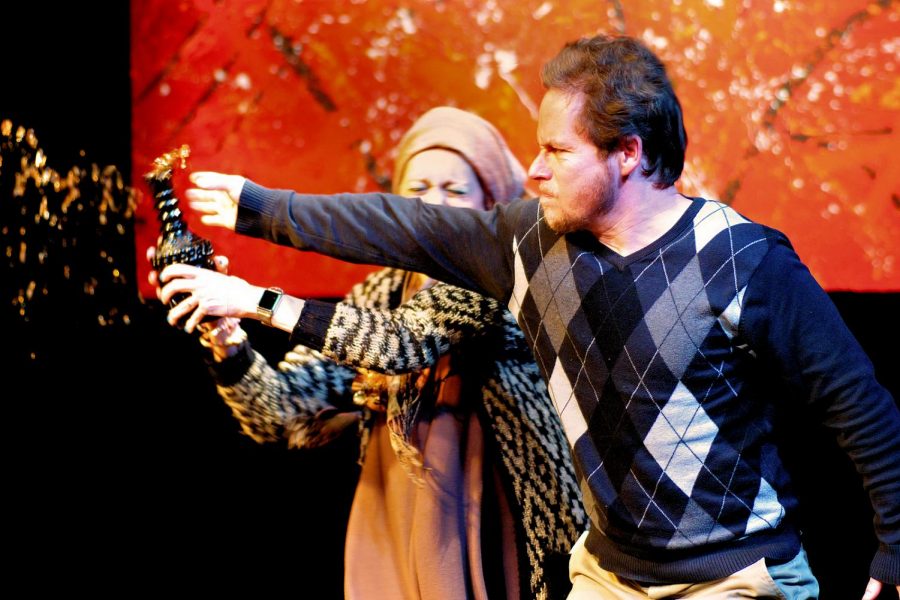Iowa City Community Theatre’s grotesquely funny production of God of Carnage explores the complexity of human nature
Iowa City Community Theatre depicts the darkness, selfishness, and unhappiness that lives inside us in its production of the dark comedy God of Carnage
January 24, 2020
Iowa City Community Theatre opened their fourth show of the season, God of Carnage on Jan. 24, which will run until Feb. 2. The Tony Award winning play follows two parent couples, the Novak’s and the Raleigh’s, who have gathered to discuss a playground fight that ensued between their 11 year old sons. As the night goes on, tensions rise and a night of drinking ensues; what was meant to be a civilized conversation descends into chaos.
The four-character cast, directed by Susan Hamel, brought the discomfort and grotesqueness of God of Carnage to life. The play flitted between humor and heaviness, and even the most hilarious scenes gave way to silent, uncomfortable pauses or tearful arguments.
The audience was immediately thrust into the intimacy of the play, forced to watch closely as the horrors of the night unfolded. The first row of seats were on the same level as the stage, only a few feet from the living room set that housed the small cast for the entirety of the performance. Often, a wild and screaming Jocko Motyko, who played Michael Novak, the father of one of the children, stomped dangerously close to the brave souls seated nearby, glaring down at them ferociously.
RELATED: Almost, Maine is a warm and delicate delight from the Iowa City Community Theatre.
Motyko was the clear comedic center of the play; from his blunt jokes to his dramatic tirades, he drew the most laughs from the audience. Trent Yoder, who played Alan Raleigh, complemented Motyko’s tumultuous performance by remaining dry and deadpan, perfectly depicting the crude carelessness of a disinterested father and a distant husband. Motyko and Yoder’s onstage chemistry was excellent, and both seemed a natural fit for their roles.
Valerie Davine, who played Veronica Novak, succeeded in bringing a groundedness to the performance that, by the end, had been lost, sending the last scraps of sanity in the room to the wind.

Actress Nicole DeSalle performs as Annette in God of Carnage at the Iowa City Community Theater on Thursday, January 23rd, 2020. God of Carnage follows a smug pair of couples discussing a fight with their children, but the night gradually descends into chaos as egos clash and rum is poured.
Nicole DeSalle, as Annette Raleigh, was wonderful at making the tension palpable. Sweet and submissive on the surface, the straining of her facial muscles when reacting to the rudeness of her onstage husband, or awkwardness of the conversation, gave away her discomfort and disdain. As Annette became tipsy, DeSalle was a delight, skipping around the stage causing mischief, and lightening the darkness cast by Motyko’s increasingly aggressive Michael.
Hamel’s blocking direction was especially impressive. The way that characters circled, snuck up on, and towered over each other gave a physicality to the unhappiness that stalked them throughout the night.
Additionally, Hamel used blocking to intensify the gender war that raged onstage between the husbands and their wives. At the beginning of the play, Alan and Michael were seated in front of their wives, partially blocking them from view. They faced the audience, their backs to the women, sharing conspiratorial glances while their wives muttered to each other behind them.
Later on, when Veronica and Annette had made a victory over their husbands, they took the seats in the front. By the end of the play, the characters were scattered across the room, each one isolated from the others. There was no clear winner.
At first, the play seemed a bit low-energy, and the actors a bit stiff, but as the night continued, and, coincidentally, as the characters became more drunk, the cast settled into their roles and their performance went on with ease. When it was over, the audience applauded their approval, laughing over the absurdity they had just witnessed.
But be warned: after the giggles have worn off, the more haunting aspects of the play remain. God of Carnage is, above all, a play that questions the truth of human nature. Hamel and the Iowa City Community Theatre’s answer is a dark one.



